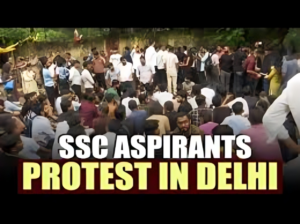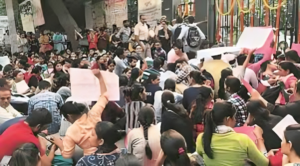Delhi SSC Exam Protest Turns Tense as Teachers Face Arrest
Introduction
In late July 2025, Delhi saw large protests by teachers demanding fair transfer policies and better work conditions. What began as peaceful demonstrations outside the SSC office turned tense when police stepped in and arrested several educators. This incident raises questions about dialogue, teachers’ rights, and the way authorities handle protests.

Background of the Protest
Teachers in Delhi have long voiced concerns over:
- Unclear transfer rules – Frequent transfers disrupt family life and teaching continuity.
- Overloaded duties – Many teachers juggle multiple roles without extra pay.
- Delayed salaries – Administrative delays affect morale.
These issues led heads of several teacher unions to call a protest on July 30, 2025, outside the Staff Selection Commission (SSC) regional office. What teachers wanted was:
- A transparent transfer policy with fixed timelines.
- A clear workload matrix.
- Assurance of timely salary release.
How Events Unfolded
Early Morning Gathering
By 9 AM, over 200 teachers gathered peacefully. They held placards reading “Fair Transfers Now” and “Respect Our Work.” Organizers had secured permission for a static demonstration, promising to disperse by 1 PM.
Police Intervention
At around 11:30 AM, the police asked protesters to move to a designated lane, citing traffic disruption. When teachers refused—insisting their demand was urgent—officers began making announcements to clear the road. Tensions rose as a few protesters sat in a sit-in.
Arrests and Aftermath
By 12 PM, police moved in. Reports say 15 teachers were picked up for “obstruction of public way” and “non-compliance with lawful orders.” Most were released on bail the next day, but three union leaders face pending charges.
Impact on Education Community
Morale and Trust
- Fear among teachers: Many worry protesting could lead to punitive transfers or loss of job security.
- Unity in unions: The arrests galvanized unions to plan a meeting july 5, 2025, to chart future action.
Student Effect
Students found classes disrupted for two days at schools where arrested teachers worked. Parents expressed frustration over sudden schedule changes but also sympathized with teachers’ cause.
Real-Life Example: South Delhi School Case
At Ramjas Public School, Ms. Kapoor, a senior math teacher, was among those arrested. She had taught there for 12 years and was due for a transfer next month. Ms. Kapoor said:
“I love my students here. Moving me suddenly far away hurts them more than me. I just wanted the government to talk.”
Her brief detention shook the school community. Students organized a small “Welcome Back” card drive when she was released, showing how deeply the protest affected them.
Dialogue vs. Confrontation
Why Dialogue Matters
- Early talks prevent escalation.
- Joint committees can frame policies acceptable to both sides.
- Mediation by neutral bodies can help find middle ground.
Risks of Heavy-Handed Response
- Criminalizing protest can discourage legitimate grievances.
- Public sympathy may swing toward protesters if arrests seem unfair.
- Long-term distrust between teachers and administration grows.
Recommendations for Moving Forward
- Set up a review committee with equal teacher-admin representation.
- Publish clear transfer policy before next school year.
- Establish a helpline for salary or duty-roster issues.
- Train police in protest-management focused on de-escalation.
These steps can ensure teachers feel heard, and authorities maintain order without undue force.

Conclusion
The July 2025 SSC exam protest in Delhi shows how essential open dialogue is for conflict resolution. Teachers, the backbone of education, deserve clear policies and respect. Authorities must balance maintaining public order with protecting right to protest. By working together, both sides can build a stronger, more trusting education ecosystem in Delhi.